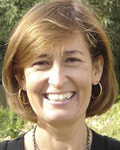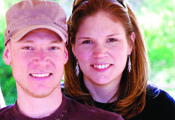Margarida Amaral, Ivo Telley, Erin Tranfield – EMBL exports to Portugal
On 18 July, the Faculty of Sciences at the University of Lisbon and EMBL organised an event dedicated to molecular biology in Portugal and at EMBL – local alumni were involved as co-organisers, speakers and participants.
More than 230 scientists took part in the event exploring connections between EMBL and Portugal. A packed programme of talks by senior EMBL staff, alumni, and researchers from Portuguese institutions addressed topics including functional genomics, system genetics and the frontiers of microscopy, showcasing research, facilities and training opportunities, as well as science by EMBL alumni in Portugal.

Alumna Margarida Amaral, coordinator of the Center for Biodiversity, Functional & Integrative Genomics at the University of Lisbon’s Faculty of Science (FCUL), co-organised the event and delivered a talk.
What was your aim for this event?
The organisation of this event resulted from a joint initiative of FCUL Director, Prof Pinto Paixão, and EMBL Director General, Prof Iain Mattaj, during a visit of Pinto Paixão to EMBL Heidelberg in November 2012, to foster the relationships between EMBL and Portugal. This meeting takes place at a time when Portugal, due to the economic crisis, needs to strengthen its connections with European institutions. The aim was to promote among Portuguese researchers how they can benefit from European support, by providing examples of collaborations, past and present, between Portuguese researchers and EMBL. FCUL director Pinto Paixão sees the connection as very important. The event also presented a platform to discuss future partnerships.
What has been the outcome?
The meeting was very successful: a large proportion of the 230 participants – presenting 77 posters – were young researchers. Altogether, the event provided opportunities to strengthen scientific networks, and learn more about career and collaboration opportunities at EMBL. There were also special sessions for informal discussions on EMBL Core Facilities, the department of International Relations, as well as a special session with Director General Iain Mattaj and company representatives.
What are your own plans for the future?
My work has evolved from studying cystic fibrosis from a molecular biology perspective into a systems biology approach. To this end, my two-year sabbatical at EMBL has been crucial. Our vision is that BioFIG becomes a systems biology research institute, incorporating researchers from areas like maths, physics, and bioinformatics, currently dispersed across FCUL. Hopefully this new institute will become a partner of EMBL in the future!

We also spoke with two recent postdocs, and newlyweds, now working at the Instituto Gulbenkian de Ciência (IGC) as group leader, Ivo Telley, and Electron Microscopy Facility Head, Erin Tranfield, who joined other alumni at a roundtable lunch with EMBL Director General Iain Mattaj.
Interview with Ivo Telley and Erin Tranfield
What did you gain from this event?
Ivo: I looked forward to learning about the research experiences of other alumni, and their transition to institutes in Portugal. I also valued Iain’s message to the Portuguese research community: in short, opportunities are there but you have to be proactive.
Erin: I enjoyed the discussion with Iain, and the chance to meet other alumni, some of whom I hope to work with in the future.
What drew you to Portugal and the IGC?
Ivo: The IGC is well funded through the Calouste Gulbenkian foundation, and teaching is optional so group leaders can concentrate on their research. Groups are small, most facilities are shared, and interaction between researchers, and therefore collaboration, is very high. Moreover, Erin and I were both offered good positions.
Erin: I was attracted by the enthusiasm of scientists for electron microscopy, the endless opportunities for collaboration, and the opportunity to build an Electron Microscopy Facility to help address their research questions. It’s an added bonus that the IGC is located in such a lovely country as Portugal.
Tell us about your work and future plans.
Ivo: My research background and interest is in physics and the mechanical aspects of cellular processes. I focus on the mechanical characterisation of mitosis, investigating this process in fruit fly embryo, more precisely in the extract of individual embryos, using an assay I developed at EMBL. The plan is to apply the methods to different insects and investigate if there are conserved mechanisms. A long-term goal is to develop tools to decipher the mechanics of chromosome segregation and the accompanying change of the cytoskeleton.
Erin: I’m centralising the institute’s existing electron microscopy infrastructure, and am about to implement a high pressure freezer that will allow us to improve sample preservation and the quality of our ultra-structural investigations – this will increase our research capabilities. I have big dreams to expand the capabilities of our current electron microscopy to include higher resolution transmission and the introduction of scanning.
As well as moving to Portugal, setting up their labs and facilities, Erin and Ivo married in Switzerland on 4 August – congratulations!